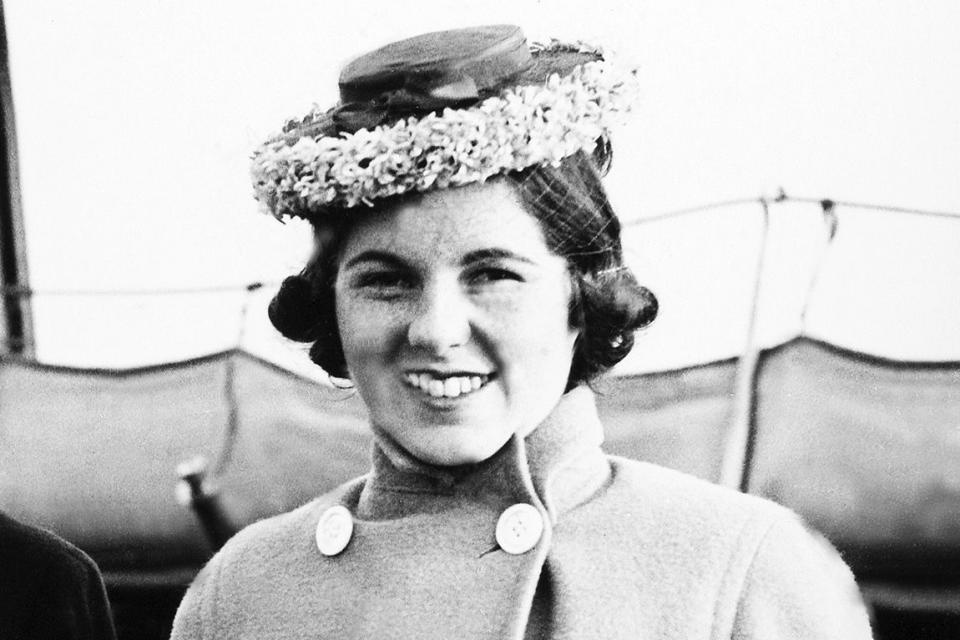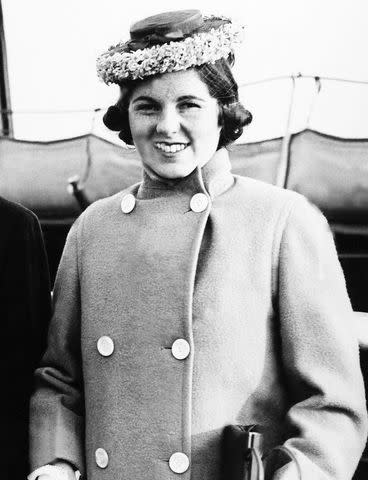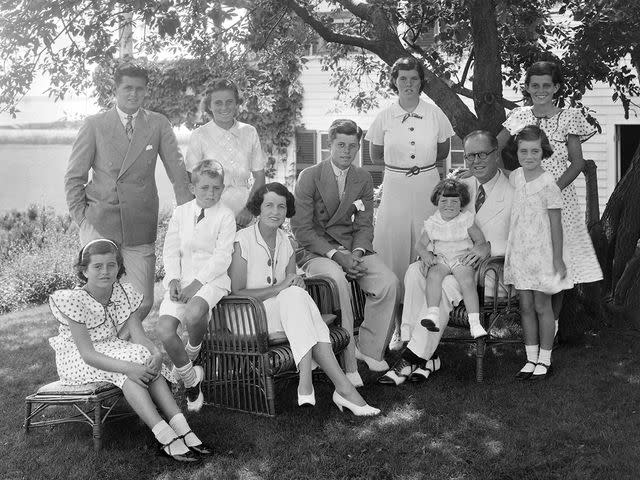Rose Kennedy Once Said Daughter Rosemary's Lobotomy Was Her Family's 'Worst Tragedy': New Book
- Oops!Something went wrong.Please try again later.
- Oops!Something went wrong.Please try again later.
- Oops!Something went wrong.Please try again later.
- Oops!Something went wrong.Please try again later.
Following the lobotomy, Rosemary was sent to live at a Catholic facility for the mentally disabled in Jefferson, Wisconsin

Keystone-France/Gamma-Keystone via Getty
A new book is shining a light on one of the more hidden members of America’s most iconic political dynasty: Rosemary Kennedy, the younger sister of John F. Kennedy who underwent a disastrous lobotomy at the age of 23.
Rosemary, the third child of Joseph P. Kennedy and Rose Fitzgerald’s nine children, was born mentally impaired and struggled with behavioral issues and rages in her younger years. By 18, she was still at the fourth-grade level in school while her other siblings were advancing in academia and politics.
When she was 23, her father scheduled a lobotomy without telling his wife. The procedure had disastrous consequences, leaving Rosemary with the mental capacity of a toddler.
Following the lobotomy, the Kennedy patriarch sent Rosemary to live at Saint Coletta’s, a Catholic facility for the mentally disabled in Jefferson, Wisconsin, where she lived for six decades.

In her new book, White House By The Sea: A Century of the Kennedys at Hyannis Port, out June 27, author Kate Storey focuses on the family's deep connection to the Cape, including new details on Rosemary's life when she returned to Hyannis Port after the lobotomy, as well as interviews with her Shriver nephews and long ago neighbors.
The book also delves into what Rosemary's life was like there before Joe Kennedy sent her away for the lobotomy — as well as what it was like when she returned to Hyannis Port following his death.
"Rosemary really loved Hyannis Port as a child," Storey told PEOPLE in a recent interview.
Related: Why Rosemary Kennedy's Siblings Didn't See Her for 20 Years After Her Lobotomy
As Storey learned in her research, the Kennedy family compound was where the children learned how to swim — and where Rosemary often went sailing with her sister, Eunice (the sibling with whom, by all accounts, she was closest).
"[Rosemary] was very much a part of that community," Storey says. "The neighbors I spoke to remember her, just as they remember all of the other siblings, kind of running around and playing with dolls with the neighbor girls and swimming in the ocean."
But life was much more challenging for Rosemary than for the other Kennedy children.
“I think a lot of things were difficult for Rosemary growing up," Storey says. "She was kind of shuffled back and forth between doctor's appointments."

Still, Hyannis Port remained something of a refuge, and was the site of many yacht club dances Rosemary attended with her brother, Jack. "It was very important to her mother, Rose, that Rosemary be included in everything that the kids did. So if they were running out to go play tennis, it was always like, 'Make sure Rosemary is going with you.' "
After the lobotomy, when Rosemary moved to Saint Coletta’s, she stopped visiting Hyannis Port — the lack of visits didn't go unnoticed by neighbors, Storey says, though world events meant that life was upended in more ways than one.
“It was 1941, so the World War II was going on and there were a lot of neighbors' kids who weren't coming back because they were sent away to the war and they had neighbors who died in the war," Storey says. "So Rosemary going away was not something that was really talked about that much in the community. "
By the 1970s, following Joe Kennedy's death, Rosemary finally returned to the place she once found so much solace.
"A couple of years after Joe Kennedy died, Rose Kennedy started bringing Rosemary back to Hyannis Port." Storey says. "And that continued ... almost every summer until the end of her life."
Those return visits offered a sense of return to childhood, with Rosemary staying at her sister's Eunice's house and visiting the family's favorite ice cream shop, Four Seas. Other times, the family would throw Rosemary pretend birthday parties, knowing that the celebration was one of her favorite things.
“I talked to her nephews — Anthony Shriver and Tim Shriver and Mark Shriver," Storey says. "Anthony said that Rosemary really loved her birthday, so they would have birthday cake for her a couple of times a week and sing Happy Birthday and do the candles and do the whole thing. And she just loved it. You could just see the expression on her face, how happy it made her."
On her Hyannis Port visits, Rosemary also spent a lot of time with her brother, Ted.
"I heard just beautiful stories about Ted and Rosemary sitting at the piano and Ted playing and singing their favorite songs that they sang together as children and how happy that made her," Storey says.
For her mother Rose, the visits back home was also a painful reminder of what her daughter had lost undergoing a lobotomy, a procedure which her husband had not told her about until after the fact.
In a conversation with neighbor Nancy Tenney — as recounted in an oral history cited by Storey in her book — Rose was reflecting on the many tragedies that had befallen the Kennedy clan. At one point, Nancy asked the matriarch, "What do you think the worst tragedy has been?"
"And she described Rose as kind of pausing for a beat and thinking for a moment and saying that what happened to Rosemary was the worst tragedy," Storey says. "She confided to Nancy that when Joe had arranged for the lobotomy, that he hadn't told Rose about that."
Rosemary died in 2005 at age 86. She was at Saint Coletta’s at the time, though Hyannis Port remained, for her and her siblings, home.
According to Storey, those who knew her, described Rosemary as content when she was with her family. Despite the challenges she had with articulating her emotions, it was clear that she found some comfort there.
“They described [how] a happy expression kind of washed over her face," Storey says, adding that the water was where Rosemary found the most solace. "She loved swimming as a child and she loved swimming as an adult, and they would shut down the pool for her when she was there and turn it as hot as it would go. She liked it hot and she would lay and float in the water. She just seemed very comfortable and content."
For more People news, make sure to sign up for our newsletter!
Read the original article on People.

